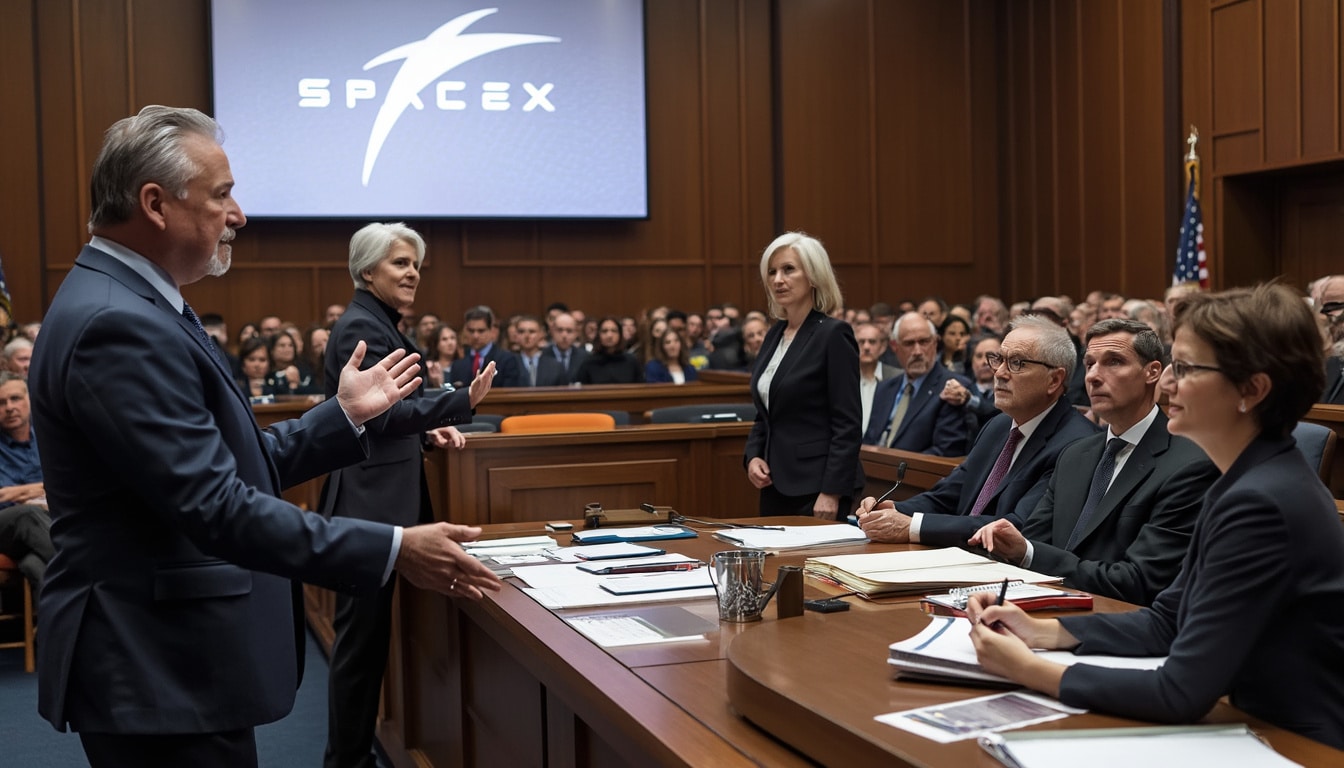The legal landscape surrounding SpaceX has recently experienced significant turbulence with allegations of discrimination against the company. The U.S. Department of Justice (DOJ) had launched a lawsuit against Elon Musk’s space innovation firm, claiming that it violated federal regulations by refusing to employ refugees and asylees. Recent developments indicate that the DOJ is reconsidering its position, seeking to drop the case, which could potentially alter the course of how companies handle hiring practices concerning immigrants.
Understanding the ramifications of such allegations is critical not only for SpaceX but also for the broader conversation about corporate responsibility and the ethical implications of hiring policies in the tech industry. This article dives deep into the ongoing controversy, its background, and its potential impacts on the future of employment law and corporate governance in the United States.
Understanding the Allegations Against SpaceX
In the suspended lawsuit, the DOJ accused SpaceX of committing discriminatory hiring practices by not considering applications from individuals who were granted asylum or refugee status within the United States. These claims arose after former employees reported that recruiting efforts were skewed towards permanent residents and citizens, effectively sidelining asylees, a demographic that often faces significant barriers to employment in high-tech industries.
This scrutiny to SpaceX highlights broader societal challenges, particularly issues facing migrants seeking stable employment in their new homeland. Discriminatory hiring practices have been an ongoing concern across industries, with corporations facing increasing pressure to ensure their hiring policies are both equitable and lawful.
The Role of Federal Law
Federal law prohibits discrimination against workers based on their immigration status, particularly under the Immigration and Nationality Act (INA). This law mandates fair treatment in hiring practices and promotes equality within the workforce. The accusations towards SpaceX underscore the importance of adherence to these legal standards, especially for high-profile companies that set precedents for others in the industry.
SpaceX’s pushback against the government’s claims seeks to assert its commitment to lawful hiring practices while simultaneously protecting its corporate interests. The case brings to light the delicate balance corporations must maintain between adhering to regulatory standards and navigating potential legal disputes efficiently.
As these legal clashes unfold, they also generate discussions surrounding best practices that companies should adopt e.g., comprehensive training regarding hiring legislation to facilitate better understanding among hiring managers and HR personnel.

Impact on SpaceX and Its Workforce
As a pioneering company in the aerospace sector, SpaceX plays a critical role not only in advancing technology but also in shaping employment practices within its industry. The implications of the discrimination lawsuit extend beyond legalities; they raise questions about the company’s culture and its approach towards fostering an inclusive workplace.
The tech community often touts its commitment to diversity and inclusion. However, situations like those faced by SpaceX highlight potential gaps between rhetoric and reality. Addressing these allegations proactively could become a turning point for SpaceX’s workforce dynamics. Implementing more inclusive and transparent hiring practices can help reinforce the company’s reputation while ensuring compliance with federal laws.
Industry analysts suggest that the outcome of this legal battle may serve as a model for how other companies approach similar issues. A proactive stance on hiring from a diverse talent pool not only promotes innovation but solidifies a company’s standing as a responsible corporate citizen.
Legal Precedents and Broader Implications
The SpaceX discrimination case sits amidst a larger trend of legal scrutiny involving technology companies and their hiring practices. As the industry grapples with an evolving legal landscape, discerning how companies respond to such accusations becomes essential in understanding future directions in employment legislation.
Historically, discrimination lawsuits within the tech sector often lead to reforms and changes in corporate policies. Lessons learned from previous cases, and their outcomes directly influence how organizations structure their affirmative policies. This case is no different, highlighting the tension between governmental oversight and corporate autonomy.
Shaping Future Hiring Practices
As the DOJ reviews whether to pursue the case against SpaceX further, other companies observe intently. The broader implications of these proceedings signify a crucial moment for the tech industry, especially concerning how companies engage with immigrant workers. A shift towards embracing a more equitable hiring approach can catalyze more comprehensive changes across various sectors.
Proactive measures, including the establishment of clear hiring policies that include strict guidelines against discrimination, can mitigate future conflicts. Companies that successfully foster a culture of diversity can not only enhance their public image but also improve internal morale and employee retention.
Consequently, when firms model inclusivity in their hiring practices, the industry can shift towards a more equitable landscape, reducing biases that hinder opportunities for marginalized groups.

Response and Adaptation
Organizations facing similar allegations often resort to revamping their hiring processes to reinforce their commitment to non-discrimination. SpaceX’s response to the allegations could involve developing training programs aimed at sensitize employees regarding the need for equitable treatment and fulfilling legal obligations.
Creating a transparent hiring pipeline allows companies to build trust and accountability within their workforce. As scrutiny increases on the tech sector, companies like SpaceX have an opportunity to demonstrate their commitment to social responsibility, further addressing community concerns about ethics.
Furthermore, adapting to industry challenges by adopting frameworks promoting diversity leads to sustainable practices that benefit both employees and organizations. Increased representation from various backgrounds not only enhances company culture but prepares firms to meet diverse customer needs, positioning firms favorably in competitive markets.
Future Outlook for SpaceX and Similar Companies
As the legal proceedings regarding employment practices unfold, the outcome will undoubtedly set the tone for how corporations navigate discrimination allegations moving forward. SpaceX, as a high-profile entity, is under particularly intensive scrutiny, testing its ability to manage public perception while addressing legal challenges.
The company’s position in the aerospace sector renders it a pivotal player. How it chooses to engage with issues of hiring discrimination could influence regulatory approaches towards the entire industry. Moreover, a favorable resolution for SpaceX may embolden other firms to adopt similar practices without fear of repercussion.
The industry seems poised for a shift, where transparency and accountability in hiring practices will likely become paramount. A strategic approach can also enhance SpaceX’s operational success, revealing the deeper benefits of creating an inclusive work environment while serving as a benchmark for peers in the sector.
The Importance of Corporate Responsibility
Corporate responsibility is transforming from a buzzword to a demand as consumers and employees alike expect companies to align their business practices with social ethics. SpaceX’s actions in the wake of these accusations could redefine expectations about corporate engagement in societal issues. By placing a premium on fair hiring practices, companies signal their commitment to equality, changing the narrative of the tech industry as a whole.
Moving forward, the ripple effects of this case could influence legislative discussions aimed at reinforcing protections for vulnerable demographics in the workforce.

Conclusion: Navigating the Challenges Ahead
As companies like SpaceX encounter scrutiny over hiring practices, the balance between adhering to legal standards and building a proactive organizational culture becomes crucial. The outcome of the discrimination allegations will serve as a key indicator of how far the industry has come in ensuring fairness and promoting inclusion.
In an increasingly interconnected world, corporations must recognize their roles in shaping societal narratives around employment and equality. By addressing these challenges with transparency and ethics, they can cultivate more inclusive environments that benefit everyone.
The conversation surrounding employment law and hiring practices will undoubtedly evolve, and with it, so too will the expectations placed upon organizations striving for excellence in corporate governance.




Leave a Reply